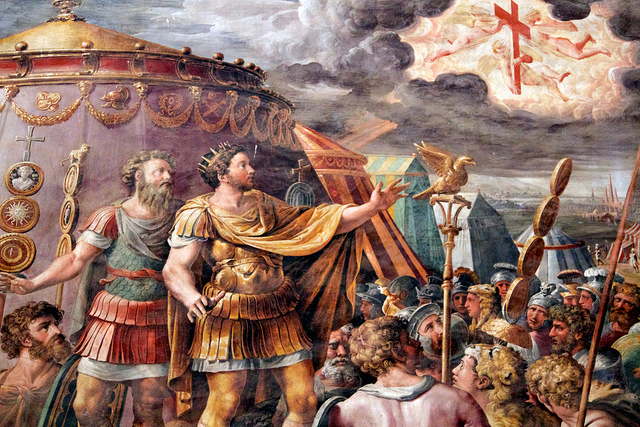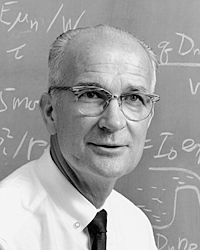There are many different opinions surrounding the conversion of Constantine the Great, the Roman emperor known for reuniting the divided Rome after taking power as the sole emperor of the Roman empire.1 His conversion is said to have taken place sometime after his victory at the Battle of Milvian Bridge in 312 CE, after which he issued the Edict of Milan, allowing Christians in the Roman Empire to openly practice their faith.2 Proving when and whether Emperor Constantine ever converted to Christianity has been a subject for scholarly debate. There are many scholars who present arguments both in favor of and in opposition to the conversion of Constantine. Among these scholars are Edward Gibbon and Thomas G. Elliott. The arguments presented by each of these scholars is unique and convincing in its own way. Gibbon argues that Constantine did convert, while Thomas G. Elliott argues that he did not.3

While both arguments have their merits, Gibbon’s argument is the stronger of the two. I argue that his argument is stronger because it acknowledges the fact that, while the conversion may have had various motives, it still amounted to a conversion. It is possible for Constantine to have converted to Christianity, especially because of the account of his experiences during the Battle of Milvian Bridge; but I also understand that he may have made his decision to convert as an emperor—or even as a commander in war—rather than as a matter of individual faith. Gibbon’s argument is backed by solid evidence for this sentiment, and because of the evidence he presents, I find his claim more convincing.
Edward Gibbon, a supporter of Constantine’s conversion, authored a six-volume series titled The History of the Decline and Fall of the Roman Empire in which he analyzes and dissects important events in Rome’s long history. In Volume 2, Gibbon addresses the issue of Constantine’s conversion, and he introduces an interesting perspective about it. To begin his argument, Gibbon notes that Constantine was put in a special position because “the elevation of Constantius to the supreme and independent dignity of Augustus, gave a free scope to the exercise of his virtues” and that Constantius’ ability to establish toleration during his reign gave way for Constantine to “[declare] himself the protector of the church, [and be deserving of] the appellation of the first emperor who publicly professed and established the Christian religion.”4 Gibbon goes on to say that Constantine most likely had motives surrounding his conversion, and says “that every victory of Constantine was productive of some relief or benefit to the church.”5 That quote makes it evident that Gibbon’s argument is as follows: yes, Constantine did convert to Christianity, but he did so as a political move, not as an act of faith.
Gibbon explains that one problem surrounding the question of Constantine’s conversion is the fact that no date for his conversion can be identified, and he qualifies this statement with proof that the writings of several historians including Lactantius, Eusebius, and Zosimus contradict each other by providing different timelines for the conversion.6 Gibbon goes on to point out that as a child, Constantine witnessed the cruelties inflicted on Romans—in both the East and West empires—for expressing their religion, and says that as a result, once Constantine was emperor he “immediately suspended or repealed the edicts of persecution, and granted the free exercise of their religious ceremonies to all those who had already professed themselves members of the church.”7 From this ruling to allow the free expression of faith, the people who lived under Constantine were given reason “to depend on the favor as well as on the justice of their sovereign, who had imbibed a secret and sincere reverence for the name of Christ, and for the God of the Christians.”8 Gibbon is claiming that the fundamental purpose surrounding Constantine’s conversion was politics and power, not personal conviction or divine calling. Gibbon makes it clear that in Constantine’s decision to issue the Edict of Milan and claim his own conversion, he was gaining the trust of the nation he ruled, and was therefore motivated by the chance to not only be an able emperor, but a trusted, loved, and respected one.
In opposition to Constantine’s conversion, author Thomas G. Elliott presents quite an interesting interpretation of the event, and whether or not it really even occurred. Elliott begins his article by noting that, although some believe Constantine became a Christian convert after 312, evidence exists that he was a pagan before 312.9 This introduction already raises questions in the reader’s mind as to whether or not the conversion could have been real, considering that he may have been a pagan for an extended period of time before his sudden conversion. Elliott brings about another controversial idea concerning Constantine’s faith when he mentions that while delivering a panegyric (propaganda speech) in 310, Constantine told his audience that he had “made lavish gifts to a temple of Apollo in Gaul, that in the temple he saw God himself present…[Elliott adds that] scholars had interpreted this to mean that Constantine had professed some sort of Apolline faith…[this being] the strongest indication that Constantine was pagan.”10 Already in these claims, Elliott raises the question of how credible the story of Constantine’s conversion is. But he does not stop there; he goes on to say that “Constantine tailored his statements according to the religion of his audience,” and he gives the example that in 324 Constantine sent two different version of the same letter to the church and to the general public, so as to please both groups.11 In noting this example, Elliott also makes the point that “Constantinian propaganda statements…tells against the view that this material is reliable evidence of the emperor’s personal religious beliefs.”12 Overall, the argument that Elliott makes is based on the fact that any religious professions made by Constantine were simply political propaganda used to turn the people in his favor, and that he did not convert to Christianity.
In my opinion, Edward Gibbon’s argument is more convincing, and I agree with his more than with that of Thomas Elliott. I argue that Constantine did convert to become a Christian, and the evidence that Gibbon provides gives me sufficient reason to assert Constantine’s conversion; it has also given me more insight as to when and why the conversion happened. Gibbon brings up great points in acknowledging that Christianity was probably prevalent in Constantine’s life since his childhood, that each of his victories in war was in some way beneficial to the church, and that his acceptance of the Christian faith helped him in his position of power to win over the trust of the Roman people. All of these arguments make plausible Constantine’s conversion as well as the reason for the conversion: political persuasion and power. Gibbon’s argument provides evidence that support the idea of Constantine converting for the sake of his reign as emperor, and therefore have convinced me to find substance in his argument and agree with his stance.
- Jerry H. Bentley, Herbert F. Ziegler, and Heather E. Streets-Salter, Traditons & Encounters: A Brief Global History From the Beginning to 1500, Fourth, vol. 1 (New York: McGraw-Hill Education, 2016), 170-171. ↵
- Jerry H. Bentley, Herbert F. Ziegler, and Heather E. Streets-Salter, Traditons & Encounters: A Brief Global History From the Beginning to 1500, 170-171. ↵
- Edward Gibbon, The History of the Decline and Fall of the Roman Empire, vol. 2, 6 vols. (Penguin Classics; Reprint edition, 1996), 126, 427-428, 433-434; Thomas G. Elliott, “The Language of Constantine’s Propaganda,” Transactions of the American Philological Association (1974-) 120, 349-351. ↵
- Gibbon, The History of the Decline and Fall of the Roman Empire, 126. ↵
- Gibbon, The History of the Decline and Fall of the Roman Empire, 126. ↵
- Gibbon, The History of the Decline and Fall of the Roman Empire, 427-428. ↵
- Gibbon, The History of the Decline and Fall of the Roman Empire, 433. ↵
- Gibbon, The History of the Decline and Fall of the Roman Empire, 434. ↵
- Elliott, “The Language of Constantine’s Propaganda,” 349. ↵
- Elliott, “The Language of Constantine’s Propaganda,” 349. ↵
- Elliott, “The Language of Constantine’s Propaganda,” 50. ↵
- Elliott, “The Language of Constantine’s Propaganda.”, 351. ↵



53 comments
Eugenio Gonzalez
The article is excellently written. I was unaware of the debates surrounding Constantine’s conversion, and I think you provided strong support for your opinion. By granting Roman citizens the freedom to worship, more people were encouraged to convert, and public celebrations such as mass became possible. I concur that Constantine’s conversion to Christianity was driven by political motives and the pursuit of power rather than personal conviction.
Gabriella Parra
I had never considered Constantine’s conversion to Christianity before. It seems it comes down to the way you define the term “conversion”. He might have practiced Christian rituals, but some might say he did not actually convert if he did not truly believe and profess the core tenets of Christianity. You gave great insight into this debate and offered your research in a very easy-to-understand manner. Amazing job!
Matthew Gallardo
This was a very well written article. The biggest thing that stood out to me about this article is the fact that they presented the side they disagreed with. The author puts down a firm stance on who they side with, but they also give the reader a look into the opposing side’s arguments and view, allowing the readers to make an informed decision.
Ana Barrientos
Great article! It was super fascinating to read and I liked how you structured it as well. I had no idea that there was a debate about whether Constantine converted to Christianity, it was really interesting reading the two arguments. I think you did a great job explaining both arguments as well. I agree with you, I think Gibbon’s argument was stronger and more convincing.
Yanelle Nicholson
The author did an excellent job explaining to the audience the two different viewpoints of the scholars mentioned, Gibbon and Elliott. She went on to explain what the logic was behind what the scholars believed regarding Constantine the Great converting to Christianity or not. She also explained why she sided with Edward Gibbon who believes Constantine converted to Christianity. I find this reading to be very well-written as well as interesting.
Yanelle Nicholson
The author does an excellent job in writing this research paper. The narrative is very compelling, and it kept me reading because I wanted to find out what happened next. I believe it ties very well with what we are studying in class and gives us more insight into Alexander the Great and the things he did during his time. It is very well written, and the visuals used are very helpful to help us see the areas he was talking about.
Kayla Braxton-Young
I really liked this article, I enjoyed reading this article, and it provided lots of information, I thought I had read something similar to this article before, but when reading it there was a different concept being covered, this topic was about Constantine’s conversion, and it came with very important information. I feel as though it was important to learn about this so we know the life and the past things that happened in life. I really found this article interesting and it was written well.
Abigail Delarosa
The article was very well though out. I like how you mentioned both sides of the argument and at the end said which one you agreed with. I enjoyed reading the article and I learned something from it. I like the use of pictures and sources you used and the story you told with the topic you had. Great job I can’t wait to read more of your articles.
Halie Estrada
This was a great article and so interesting to me as I am learning about it in class right now! I love reading articles about the Roman Empire because despite what it’s discussing I never fail to hear about the cruelty and gruesome details of how the Romans fought. Besides that I love the way you structured your article and how you briefed us on both sides of your argument before giving us your opinion.
Aurora Torres
Great Article! I have read about Constantine being fair with Christian people people never knew that he himself had converted to Christianity. It is possible and go with Gibbon’s argument that he was a some some point he was pagan but converted. I like that in the article you talk about how Constantine recalls when he was young Christians being executed for their religious belief and he didn’t agree with that so once he became Emperor he wanted to change things and let people believe whatever religion they wanted. Also, I believe from reading this article that he must have converted because he talks about all the victory’s he has had was because of God and wants to give Glory to God for what good things has happened. Once cannot be to certain but from the conversations that were written from Gibbon’s have more evidence that Constantine was Christian.